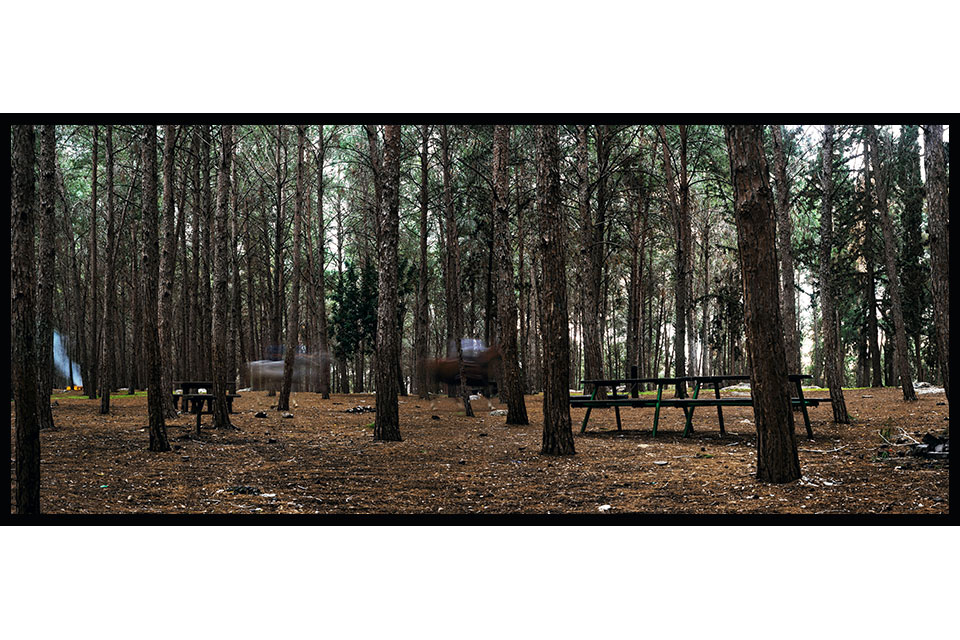About the Artist: Dor Guez

On September 20, 2012, the Rose Art Museum at Brandeis University showed 100 Steps to the Mediterranean, a solo exhibition of photography and video installations by Dor Guez, one of the most compelling emerging artists in the Middle East. Featuring selected works from his series Lydd Ruins, The Monayer Family, The Nation’s Groves, SABIR, and Scanograms, the exhibition is among the artist’s most comprehensive to date and his first major museum show in the United States.
Guez, whose heritage is both Christian Palestinian and Jewish Tunisian, takes as his overt subject the Christian Arab minority in Israel, a community marginalized by the prevailing meta-narratives of both Israelis and Arabs. Guez’s work addresses these gaps while exploring contemporary art’s role in raising questions about history, nationality, ethnicity, and personal identity.
Guez conveys the Christian Arab experience using a variety of photographic and video techniques, emphasizing their abilities to record and document as well as to manipulate and influence. His photographs range from scanned archival images to romantic, nocturnal landscapes to arrestingly beautiful lightboxes. His videos intermingle documentary, testimonial, and experimental filmmaking techniques into poignant yet unresolved narratives. The scale of the works in the Rose installation will shift from intimate to monumental, the lighting from meditative to cinematic. By seamlessly integrating distinct forms of representation, Guez invites audiences to participate in different ways of seeing, and therefore, in different ways of knowing and understanding the complexities of the Middle East today.
At the center of 100 Steps to the Mediterranean are four videos portraying one family, the Monayers—the artist’s Christian Arab grandparents and their children and grandchildren. In these videos, Guez’s camera remains primarily static, placing the viewer in close physical proximity to each family member as they dwell on their multifaceted identities, argue with one another, and consider, then reconsider, their places in Israeli society and the Arab world. The editing and sequencing of the videos, in which critical events and conversations often occur off-camera, manifest the family’s ambivalent societal status, generational differences, and individual fortitude.
The exhibition encourages rumination on the politics of place as well. The family videos are bookended by renderings of four sites in Israel: the ruins of the pre-1948 Palestinian city of al-Lydd, now Lod; the Greek Orthodox Church of St. George in Lod; a nearby Israeli national park, Ben Shemen Forest; and the Mediterranean shore in Jaffa. These places are layered with meaning for the Monayers, and the artist’s subtly different visual approaches connect them to broader national and ethnic discourses.
About the Artist
Guez was born in Jerusalem and currently lives and works in Tel Aviv. He is increasingly renowned internationally. His work has been featured in the Tel Aviv Museum of Art, Petach Tikva Museum of Art in Israel, KW Institute for Contemporary Art in Berlin, the 12th Istanbul Biennale, the 17th Videobrasil in São Paolo, the Jewish Museum in New York, and the 3rd Moscow International Biennale.
Guez will be the Ruth Ann and Nathan Perlmutter Artist in Residence at Brandeis University in conjunction with his exhibition at the Rose. Guez was also chosen as the 2012 International Artist in Residence at Artspace in San Antonio, Texas.
Guez is a lecturer in the History and Theory Department at Bezalel Academy of Arts and Design, Jerusalem, and a researcher affiliated with Tel Aviv University. In 2009 he established the Christian-Palestinian Archive, which forms the basis of much of his work and is the first archive devoted to this minority across the Middle East.
Publication
Dor Guez: 100 Steps to the Mediterranean is co-curated by Gannit Ankori, professor of Art History and Theory, chair in Israeli Art, Department of Fine Arts and Schusterman Center for Israel Studies and Dabney Hailey, director of academic programs, Rose Art Museum, Brandeis University. An illustrated catalogue with essays by the curators, artist, and Samir Srouji, a Boston architect and artist, was launched on October 30 at the Rose in conjunction with a public talk by the artist.
Additional programs, many of which connect Guez’s work with social justice initiatives and academic curricula on campus, included a panel discussion titled “Exposures: Photography and the Politics of Looking” on October 31, 2012.
Support
Dor Guez: 100 Steps to the Mediterranean is supported by Artis – Contemporary Israeli Art Fund; Schusterman Center for Israel Studies, Brandeis University; The Ruth Ann and Nathan Perlmutter Artist in Residency Annual Award Program; Lois Foster Exhibition Fund; and Office of the Provost, Brandeis University.
The programs on campus are co-sponsored by the Schusterman Center, Rose Art Museum, and International Center for Ethics, Justice & Public Life.
About the Rose Art Museum, Brandeis University
Guez’s multidisciplinary and provocative art furthers the Rose Art Museum’s history of showcasing cutting-edge work by artists on the cusp of international breakthroughs. Previous Perlmutter Artists in Residence include Roxy Paine (2002), Barry McGee (2004), Fred Tomaselli (2005), and Dana Schutz (2006).
Founded in 1961, the Rose Art Museum, Brandeis University, is an educational and cultural institution dedicated to collecting, preserving and exhibiting the finest of modern and contemporary art. The programs of the Rose adhere to the overall mission of the university, embracing its values of academic excellence, social justice and freedom of expression. The museum’s permanent collection of postwar and contemporary art is unequalled in New England and among the best at any university art museum in the United States.
Located on Brandeis University’s campus at 415 South Street, Waltham, MA, the museum is free and open to the public Tuesday through Sunday, noon – 5:00 p.m.
For more information, visit www.brandeis.edu/rose or call 781-736-3434.